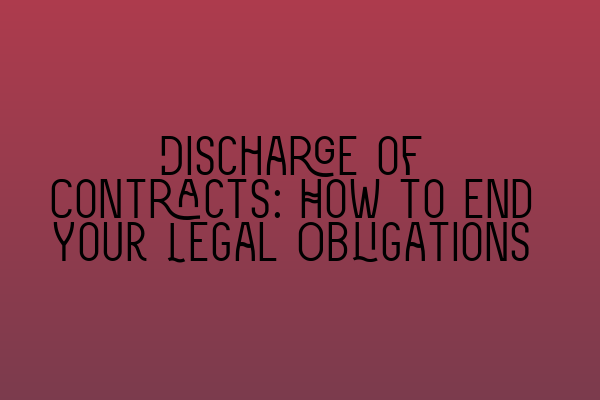Discharge of Contracts: How to End Your Legal Obligations
Contracts are an integral part of the legal landscape, governing relationships and obligations between parties. However, there may come a time when you want to end your legal obligations under a contract. This can be due to various reasons such as completion of the contract, breach of contract, or a mutual agreement to terminate the contract. Whatever the reason may be, it is vital to understand how to properly discharge a contract to avoid any potential legal consequences.
In this article, we will explore the concept of discharge of contracts, the different methods by which contracts can be discharged, and the potential implications of a discharge. Let’s dive in!
What is Discharge of a Contract?
Discharge of a contract refers to the termination or ending of legal obligations under a contract. It is a process by which the parties involved are released from their contractual duties and no longer bound by its terms. Discharging a contract can occur in a number of ways, which we will discuss in the following sections.
Methods of Discharging a Contract
1. Performance
The most straightforward way to discharge a contract is through performance. When both parties fulfill their obligations as outlined in the contract, the contract is considered fulfilled, and the legal obligations are discharged. This can involve providing goods, services, or making payments as specified in the contract. It is important to ensure that performance is carried out precisely according to the terms of the contract to avoid any disputes or potential breach.
2. Agreement
Another common method of discharging a contract is through mutual agreement. This occurs when both parties agree to end the contract before its completion. Parties may agree to terminate a contract due to changed circumstances, disagreement on terms, or other reasons. It is crucial to document the termination in writing to protect both parties and avoid future disputes. Seek legal advice to ensure the termination agreement is valid and enforceable.
3. Breach
When one party fails to fulfill their obligations under a contract, it results in a breach. A breach of contract can be a grounds for discharging the contract. The injured party may choose to terminate the contract and seek damages for the breach. However, it is important to consult with a legal professional to understand the consequences and potential remedies available in case of a breach.
4. Impossibility or Frustration
In some cases, it may become impossible to fulfill the terms of a contract due to unforeseen circumstances. This is known as impossibility or frustration of contract. For example, if a contracted venue is destroyed by a natural disaster, it may be impossible to hold an event at that location. In such cases, the contract may be discharged due to impossibility or frustration. It is essential to carefully assess the circumstances and seek legal advice to determine if these grounds apply.
Implications of Contract Discharge
Discharging a contract can have various implications for the parties involved:
– Release from obligations: Once a contract is discharged, the parties are released from their obligations and no longer bound by its terms. This allows both parties to move on from the contractual relationship.
– Liability: Discharging a contract does not absolve parties from any pre-existing liabilities and obligations that may have arisen during the course of the contract. Parties may still be responsible for any damages, fees, or penalties incurred before the contract discharge.
– Future claims: It is important to note that discharging a contract does not necessarily bar future claims. If there are any outstanding issues or claims arising from the contract, they may be pursued even after the contract has been discharged.
In conclusion, knowing how to properly discharge a contract is essential for any party involved in a legal contractual relationship. Whether it is through performance, mutual agreement, breach, or impossibility, understanding the methods of discharge can help you navigate contract termination effectively while minimizing legal risks.
For further information about law exams and training, check out these related articles:
